Protected Employee Claim Action and Enterprise Agreement Approval Process
VerifiedAdded on 2023/06/11
|10
|2473
|220
AI Summary
This article discusses the process of protected employee claim action and enterprise agreement approval under the Fair Work Act, 2009. It covers the eligibility criteria for protected industrial action, the requirements for enterprise agreement approval, and the better off overall test. The article also explains the steps involved in initiating protected industrial action and making an application for enterprise agreement approval.
Contribute Materials
Your contribution can guide someone’s learning journey. Share your
documents today.
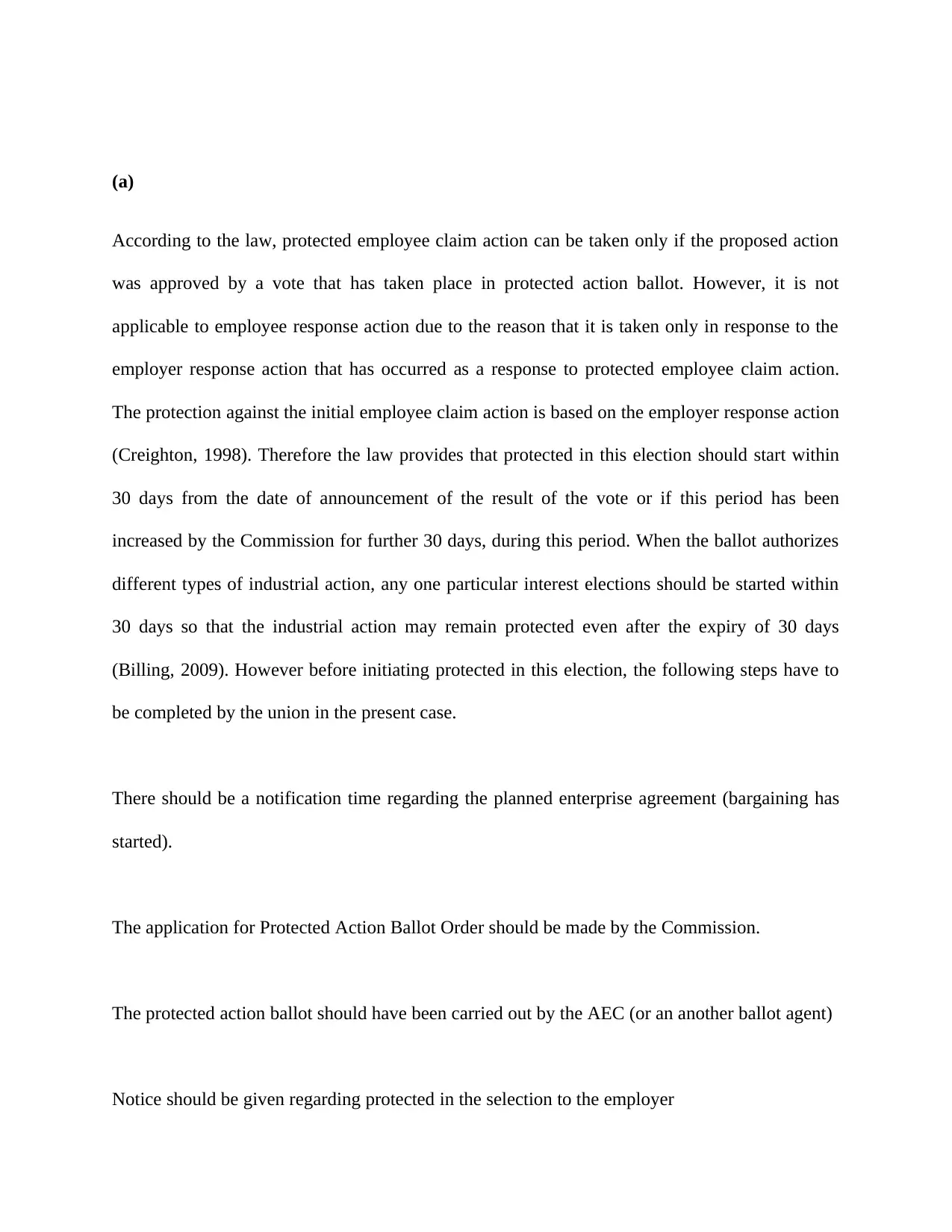
(a)
According to the law, protected employee claim action can be taken only if the proposed action
was approved by a vote that has taken place in protected action ballot. However, it is not
applicable to employee response action due to the reason that it is taken only in response to the
employer response action that has occurred as a response to protected employee claim action.
The protection against the initial employee claim action is based on the employer response action
(Creighton, 1998). Therefore the law provides that protected in this election should start within
30 days from the date of announcement of the result of the vote or if this period has been
increased by the Commission for further 30 days, during this period. When the ballot authorizes
different types of industrial action, any one particular interest elections should be started within
30 days so that the industrial action may remain protected even after the expiry of 30 days
(Billing, 2009). However before initiating protected in this election, the following steps have to
be completed by the union in the present case.
There should be a notification time regarding the planned enterprise agreement (bargaining has
started).
The application for Protected Action Ballot Order should be made by the Commission.
The protected action ballot should have been carried out by the AEC (or an another ballot agent)
Notice should be given regarding protected in the selection to the employer
According to the law, protected employee claim action can be taken only if the proposed action
was approved by a vote that has taken place in protected action ballot. However, it is not
applicable to employee response action due to the reason that it is taken only in response to the
employer response action that has occurred as a response to protected employee claim action.
The protection against the initial employee claim action is based on the employer response action
(Creighton, 1998). Therefore the law provides that protected in this election should start within
30 days from the date of announcement of the result of the vote or if this period has been
increased by the Commission for further 30 days, during this period. When the ballot authorizes
different types of industrial action, any one particular interest elections should be started within
30 days so that the industrial action may remain protected even after the expiry of 30 days
(Billing, 2009). However before initiating protected in this election, the following steps have to
be completed by the union in the present case.
There should be a notification time regarding the planned enterprise agreement (bargaining has
started).
The application for Protected Action Ballot Order should be made by the Commission.
The protected action ballot should have been carried out by the AEC (or an another ballot agent)
Notice should be given regarding protected in the selection to the employer
Secure Best Marks with AI Grader
Need help grading? Try our AI Grader for instant feedback on your assignments.
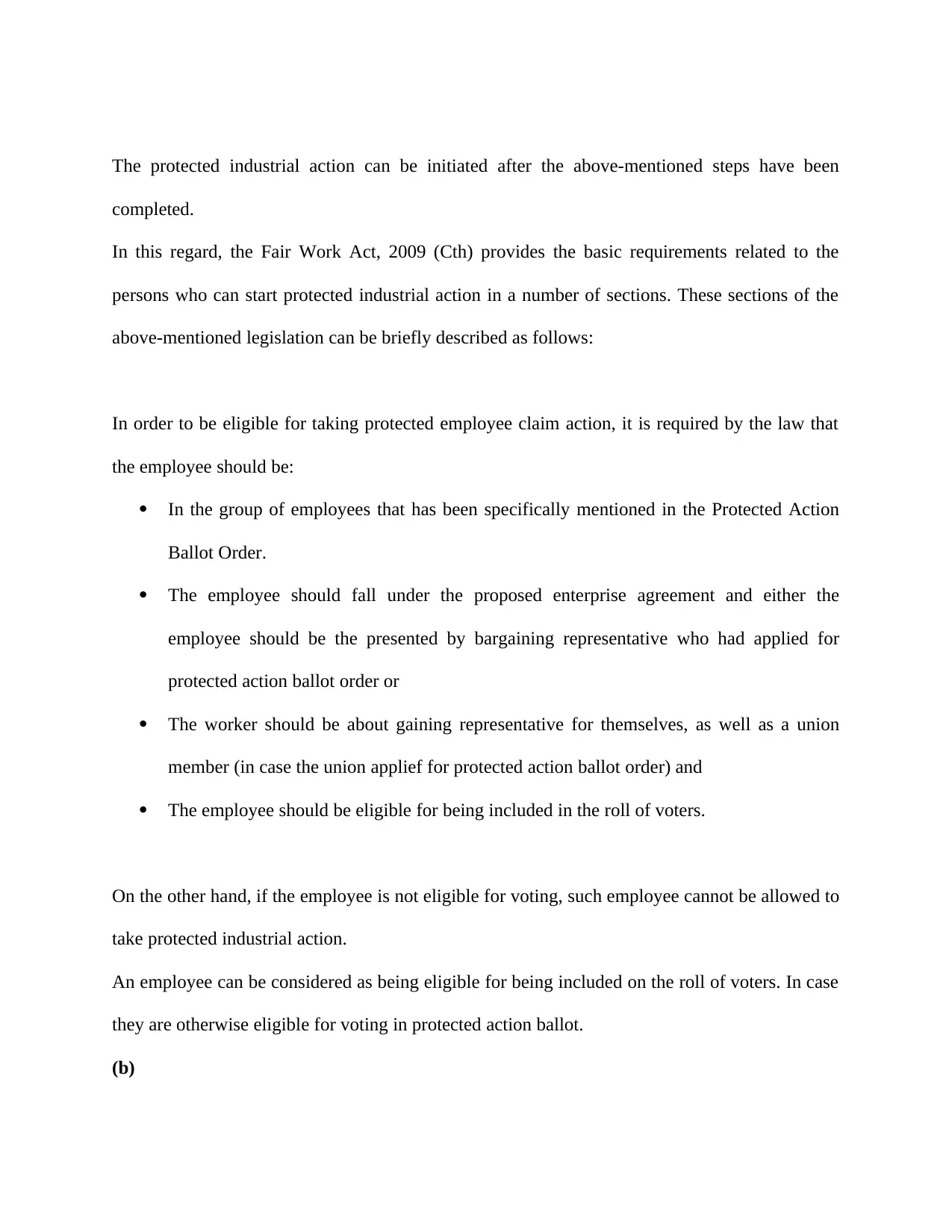
The protected industrial action can be initiated after the above-mentioned steps have been
completed.
In this regard, the Fair Work Act, 2009 (Cth) provides the basic requirements related to the
persons who can start protected industrial action in a number of sections. These sections of the
above-mentioned legislation can be briefly described as follows:
In order to be eligible for taking protected employee claim action, it is required by the law that
the employee should be:
In the group of employees that has been specifically mentioned in the Protected Action
Ballot Order.
The employee should fall under the proposed enterprise agreement and either the
employee should be the presented by bargaining representative who had applied for
protected action ballot order or
The worker should be about gaining representative for themselves, as well as a union
member (in case the union applief for protected action ballot order) and
The employee should be eligible for being included in the roll of voters.
On the other hand, if the employee is not eligible for voting, such employee cannot be allowed to
take protected industrial action.
An employee can be considered as being eligible for being included on the roll of voters. In case
they are otherwise eligible for voting in protected action ballot.
(b)
completed.
In this regard, the Fair Work Act, 2009 (Cth) provides the basic requirements related to the
persons who can start protected industrial action in a number of sections. These sections of the
above-mentioned legislation can be briefly described as follows:
In order to be eligible for taking protected employee claim action, it is required by the law that
the employee should be:
In the group of employees that has been specifically mentioned in the Protected Action
Ballot Order.
The employee should fall under the proposed enterprise agreement and either the
employee should be the presented by bargaining representative who had applied for
protected action ballot order or
The worker should be about gaining representative for themselves, as well as a union
member (in case the union applief for protected action ballot order) and
The employee should be eligible for being included in the roll of voters.
On the other hand, if the employee is not eligible for voting, such employee cannot be allowed to
take protected industrial action.
An employee can be considered as being eligible for being included on the roll of voters. In case
they are otherwise eligible for voting in protected action ballot.
(b)
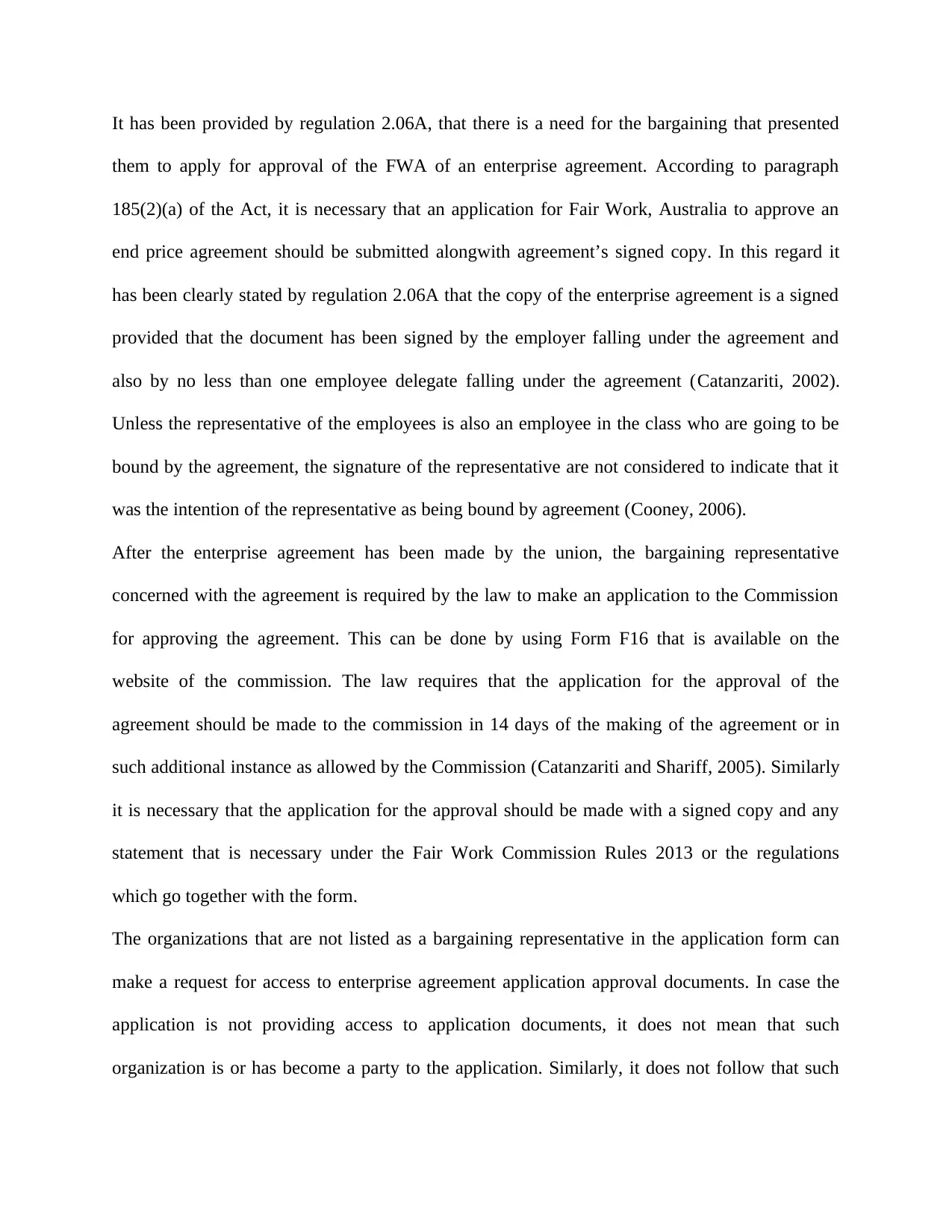
It has been provided by regulation 2.06A, that there is a need for the bargaining that presented
them to apply for approval of the FWA of an enterprise agreement. According to paragraph
185(2)(a) of the Act, it is necessary that an application for Fair Work, Australia to approve an
end price agreement should be submitted alongwith agreement’s signed copy. In this regard it
has been clearly stated by regulation 2.06A that the copy of the enterprise agreement is a signed
provided that the document has been signed by the employer falling under the agreement and
also by no less than one employee delegate falling under the agreement (Catanzariti, 2002).
Unless the representative of the employees is also an employee in the class who are going to be
bound by the agreement, the signature of the representative are not considered to indicate that it
was the intention of the representative as being bound by agreement (Cooney, 2006).
After the enterprise agreement has been made by the union, the bargaining representative
concerned with the agreement is required by the law to make an application to the Commission
for approving the agreement. This can be done by using Form F16 that is available on the
website of the commission. The law requires that the application for the approval of the
agreement should be made to the commission in 14 days of the making of the agreement or in
such additional instance as allowed by the Commission (Catanzariti and Shariff, 2005). Similarly
it is necessary that the application for the approval should be made with a signed copy and any
statement that is necessary under the Fair Work Commission Rules 2013 or the regulations
which go together with the form.
The organizations that are not listed as a bargaining representative in the application form can
make a request for access to enterprise agreement application approval documents. In case the
application is not providing access to application documents, it does not mean that such
organization is or has become a party to the application. Similarly, it does not follow that such
them to apply for approval of the FWA of an enterprise agreement. According to paragraph
185(2)(a) of the Act, it is necessary that an application for Fair Work, Australia to approve an
end price agreement should be submitted alongwith agreement’s signed copy. In this regard it
has been clearly stated by regulation 2.06A that the copy of the enterprise agreement is a signed
provided that the document has been signed by the employer falling under the agreement and
also by no less than one employee delegate falling under the agreement (Catanzariti, 2002).
Unless the representative of the employees is also an employee in the class who are going to be
bound by the agreement, the signature of the representative are not considered to indicate that it
was the intention of the representative as being bound by agreement (Cooney, 2006).
After the enterprise agreement has been made by the union, the bargaining representative
concerned with the agreement is required by the law to make an application to the Commission
for approving the agreement. This can be done by using Form F16 that is available on the
website of the commission. The law requires that the application for the approval of the
agreement should be made to the commission in 14 days of the making of the agreement or in
such additional instance as allowed by the Commission (Catanzariti and Shariff, 2005). Similarly
it is necessary that the application for the approval should be made with a signed copy and any
statement that is necessary under the Fair Work Commission Rules 2013 or the regulations
which go together with the form.
The organizations that are not listed as a bargaining representative in the application form can
make a request for access to enterprise agreement application approval documents. In case the
application is not providing access to application documents, it does not mean that such
organization is or has become a party to the application. Similarly, it does not follow that such
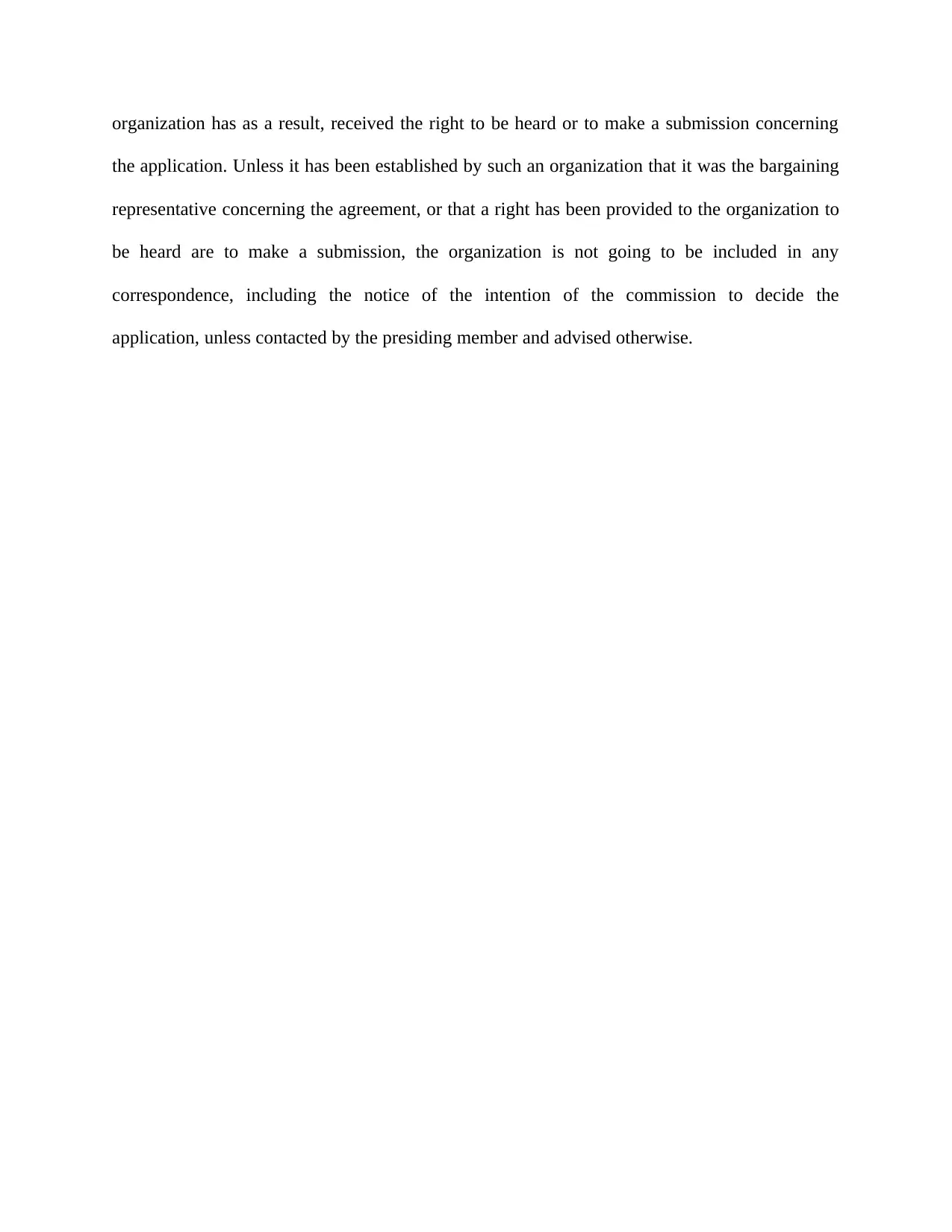
organization has as a result, received the right to be heard or to make a submission concerning
the application. Unless it has been established by such an organization that it was the bargaining
representative concerning the agreement, or that a right has been provided to the organization to
be heard are to make a submission, the organization is not going to be included in any
correspondence, including the notice of the intention of the commission to decide the
application, unless contacted by the presiding member and advised otherwise.
the application. Unless it has been established by such an organization that it was the bargaining
representative concerning the agreement, or that a right has been provided to the organization to
be heard are to make a submission, the organization is not going to be included in any
correspondence, including the notice of the intention of the commission to decide the
application, unless contacted by the presiding member and advised otherwise.
Secure Best Marks with AI Grader
Need help grading? Try our AI Grader for instant feedback on your assignments.
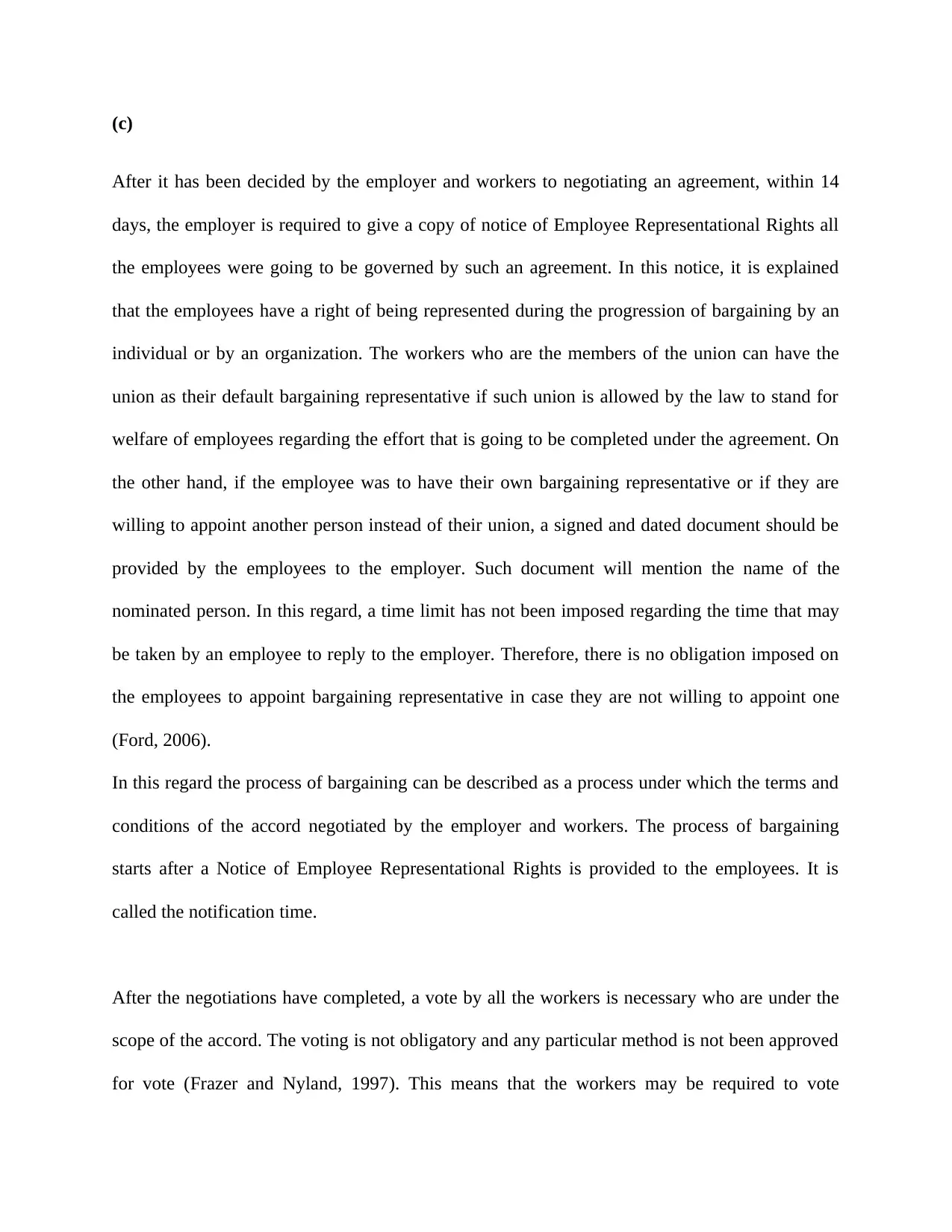
(c)
After it has been decided by the employer and workers to negotiating an agreement, within 14
days, the employer is required to give a copy of notice of Employee Representational Rights all
the employees were going to be governed by such an agreement. In this notice, it is explained
that the employees have a right of being represented during the progression of bargaining by an
individual or by an organization. The workers who are the members of the union can have the
union as their default bargaining representative if such union is allowed by the law to stand for
welfare of employees regarding the effort that is going to be completed under the agreement. On
the other hand, if the employee was to have their own bargaining representative or if they are
willing to appoint another person instead of their union, a signed and dated document should be
provided by the employees to the employer. Such document will mention the name of the
nominated person. In this regard, a time limit has not been imposed regarding the time that may
be taken by an employee to reply to the employer. Therefore, there is no obligation imposed on
the employees to appoint bargaining representative in case they are not willing to appoint one
(Ford, 2006).
In this regard the process of bargaining can be described as a process under which the terms and
conditions of the accord negotiated by the employer and workers. The process of bargaining
starts after a Notice of Employee Representational Rights is provided to the employees. It is
called the notification time.
After the negotiations have completed, a vote by all the workers is necessary who are under the
scope of the accord. The voting is not obligatory and any particular method is not been approved
for vote (Frazer and Nyland, 1997). This means that the workers may be required to vote
After it has been decided by the employer and workers to negotiating an agreement, within 14
days, the employer is required to give a copy of notice of Employee Representational Rights all
the employees were going to be governed by such an agreement. In this notice, it is explained
that the employees have a right of being represented during the progression of bargaining by an
individual or by an organization. The workers who are the members of the union can have the
union as their default bargaining representative if such union is allowed by the law to stand for
welfare of employees regarding the effort that is going to be completed under the agreement. On
the other hand, if the employee was to have their own bargaining representative or if they are
willing to appoint another person instead of their union, a signed and dated document should be
provided by the employees to the employer. Such document will mention the name of the
nominated person. In this regard, a time limit has not been imposed regarding the time that may
be taken by an employee to reply to the employer. Therefore, there is no obligation imposed on
the employees to appoint bargaining representative in case they are not willing to appoint one
(Ford, 2006).
In this regard the process of bargaining can be described as a process under which the terms and
conditions of the accord negotiated by the employer and workers. The process of bargaining
starts after a Notice of Employee Representational Rights is provided to the employees. It is
called the notification time.
After the negotiations have completed, a vote by all the workers is necessary who are under the
scope of the accord. The voting is not obligatory and any particular method is not been approved
for vote (Frazer and Nyland, 1997). This means that the workers may be required to vote
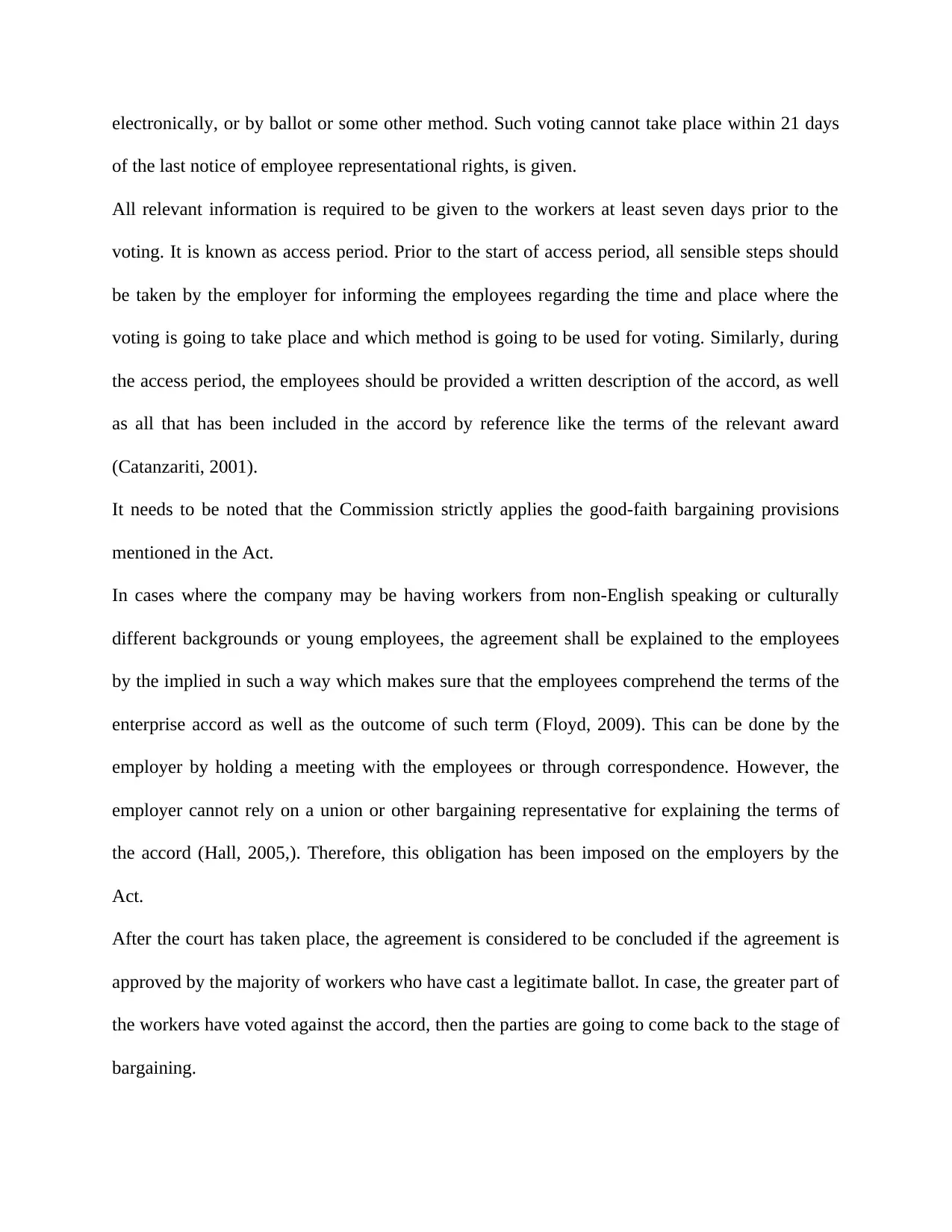
electronically, or by ballot or some other method. Such voting cannot take place within 21 days
of the last notice of employee representational rights, is given.
All relevant information is required to be given to the workers at least seven days prior to the
voting. It is known as access period. Prior to the start of access period, all sensible steps should
be taken by the employer for informing the employees regarding the time and place where the
voting is going to take place and which method is going to be used for voting. Similarly, during
the access period, the employees should be provided a written description of the accord, as well
as all that has been included in the accord by reference like the terms of the relevant award
(Catanzariti, 2001).
It needs to be noted that the Commission strictly applies the good-faith bargaining provisions
mentioned in the Act.
In cases where the company may be having workers from non-English speaking or culturally
different backgrounds or young employees, the agreement shall be explained to the employees
by the implied in such a way which makes sure that the employees comprehend the terms of the
enterprise accord as well as the outcome of such term (Floyd, 2009). This can be done by the
employer by holding a meeting with the employees or through correspondence. However, the
employer cannot rely on a union or other bargaining representative for explaining the terms of
the accord (Hall, 2005,). Therefore, this obligation has been imposed on the employers by the
Act.
After the court has taken place, the agreement is considered to be concluded if the agreement is
approved by the majority of workers who have cast a legitimate ballot. In case, the greater part of
the workers have voted against the accord, then the parties are going to come back to the stage of
bargaining.
of the last notice of employee representational rights, is given.
All relevant information is required to be given to the workers at least seven days prior to the
voting. It is known as access period. Prior to the start of access period, all sensible steps should
be taken by the employer for informing the employees regarding the time and place where the
voting is going to take place and which method is going to be used for voting. Similarly, during
the access period, the employees should be provided a written description of the accord, as well
as all that has been included in the accord by reference like the terms of the relevant award
(Catanzariti, 2001).
It needs to be noted that the Commission strictly applies the good-faith bargaining provisions
mentioned in the Act.
In cases where the company may be having workers from non-English speaking or culturally
different backgrounds or young employees, the agreement shall be explained to the employees
by the implied in such a way which makes sure that the employees comprehend the terms of the
enterprise accord as well as the outcome of such term (Floyd, 2009). This can be done by the
employer by holding a meeting with the employees or through correspondence. However, the
employer cannot rely on a union or other bargaining representative for explaining the terms of
the accord (Hall, 2005,). Therefore, this obligation has been imposed on the employers by the
Act.
After the court has taken place, the agreement is considered to be concluded if the agreement is
approved by the majority of workers who have cast a legitimate ballot. In case, the greater part of
the workers have voted against the accord, then the parties are going to come back to the stage of
bargaining.
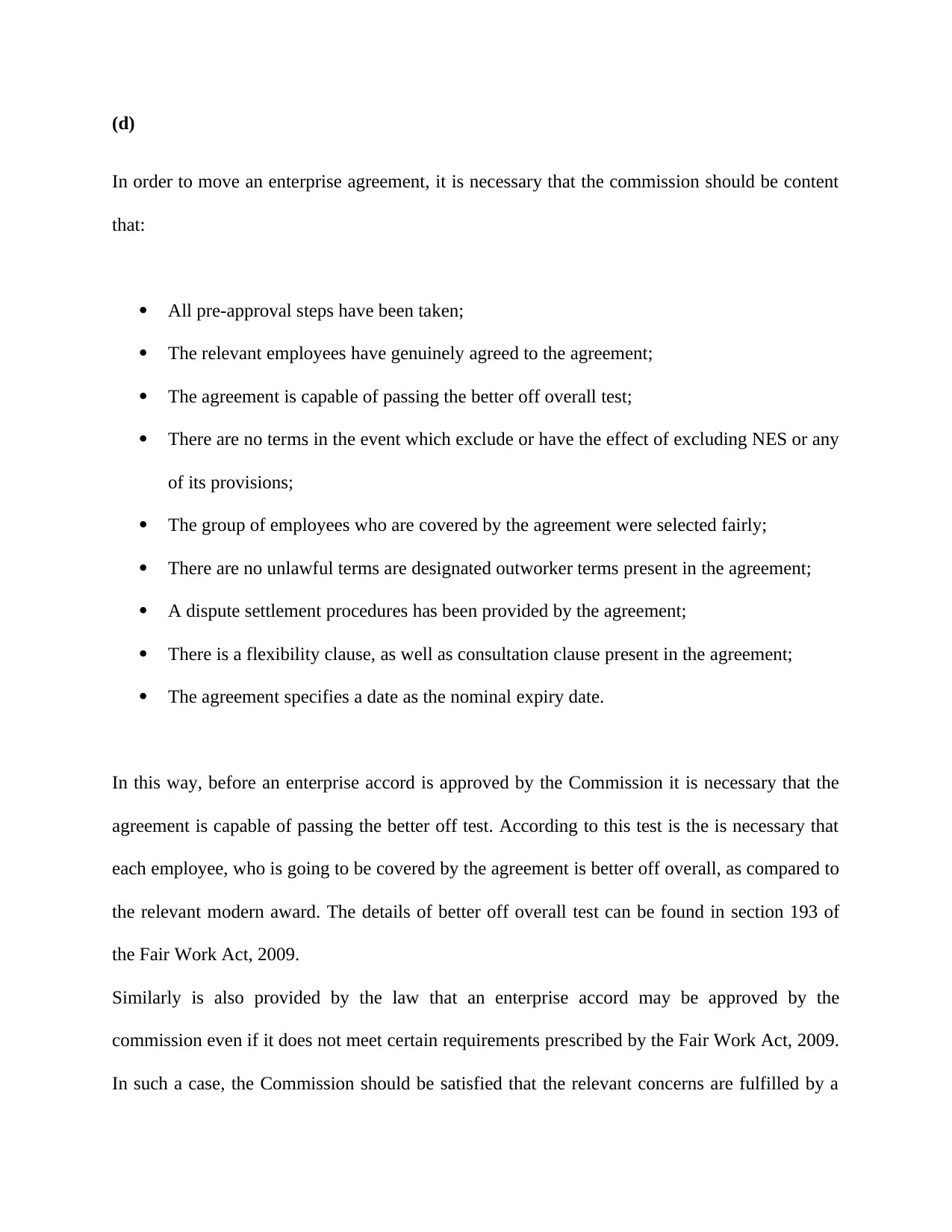
(d)
In order to move an enterprise agreement, it is necessary that the commission should be content
that:
All pre-approval steps have been taken;
The relevant employees have genuinely agreed to the agreement;
The agreement is capable of passing the better off overall test;
There are no terms in the event which exclude or have the effect of excluding NES or any
of its provisions;
The group of employees who are covered by the agreement were selected fairly;
There are no unlawful terms are designated outworker terms present in the agreement;
A dispute settlement procedures has been provided by the agreement;
There is a flexibility clause, as well as consultation clause present in the agreement;
The agreement specifies a date as the nominal expiry date.
In this way, before an enterprise accord is approved by the Commission it is necessary that the
agreement is capable of passing the better off test. According to this test is the is necessary that
each employee, who is going to be covered by the agreement is better off overall, as compared to
the relevant modern award. The details of better off overall test can be found in section 193 of
the Fair Work Act, 2009.
Similarly is also provided by the law that an enterprise accord may be approved by the
commission even if it does not meet certain requirements prescribed by the Fair Work Act, 2009.
In such a case, the Commission should be satisfied that the relevant concerns are fulfilled by a
In order to move an enterprise agreement, it is necessary that the commission should be content
that:
All pre-approval steps have been taken;
The relevant employees have genuinely agreed to the agreement;
The agreement is capable of passing the better off overall test;
There are no terms in the event which exclude or have the effect of excluding NES or any
of its provisions;
The group of employees who are covered by the agreement were selected fairly;
There are no unlawful terms are designated outworker terms present in the agreement;
A dispute settlement procedures has been provided by the agreement;
There is a flexibility clause, as well as consultation clause present in the agreement;
The agreement specifies a date as the nominal expiry date.
In this way, before an enterprise accord is approved by the Commission it is necessary that the
agreement is capable of passing the better off test. According to this test is the is necessary that
each employee, who is going to be covered by the agreement is better off overall, as compared to
the relevant modern award. The details of better off overall test can be found in section 193 of
the Fair Work Act, 2009.
Similarly is also provided by the law that an enterprise accord may be approved by the
commission even if it does not meet certain requirements prescribed by the Fair Work Act, 2009.
In such a case, the Commission should be satisfied that the relevant concerns are fulfilled by a
Paraphrase This Document
Need a fresh take? Get an instant paraphrase of this document with our AI Paraphraser
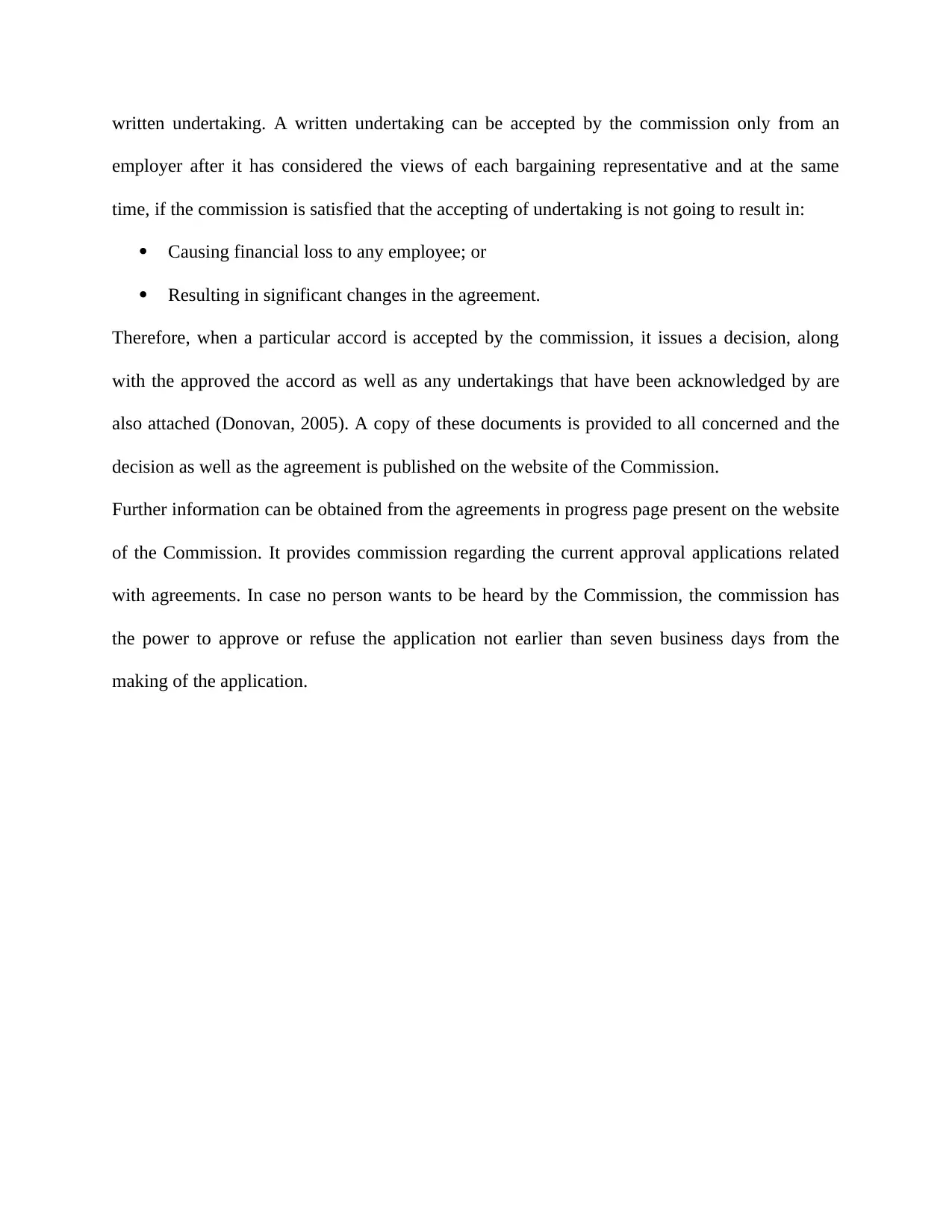
written undertaking. A written undertaking can be accepted by the commission only from an
employer after it has considered the views of each bargaining representative and at the same
time, if the commission is satisfied that the accepting of undertaking is not going to result in:
Causing financial loss to any employee; or
Resulting in significant changes in the agreement.
Therefore, when a particular accord is accepted by the commission, it issues a decision, along
with the approved the accord as well as any undertakings that have been acknowledged by are
also attached (Donovan, 2005). A copy of these documents is provided to all concerned and the
decision as well as the agreement is published on the website of the Commission.
Further information can be obtained from the agreements in progress page present on the website
of the Commission. It provides commission regarding the current approval applications related
with agreements. In case no person wants to be heard by the Commission, the commission has
the power to approve or refuse the application not earlier than seven business days from the
making of the application.
employer after it has considered the views of each bargaining representative and at the same
time, if the commission is satisfied that the accepting of undertaking is not going to result in:
Causing financial loss to any employee; or
Resulting in significant changes in the agreement.
Therefore, when a particular accord is accepted by the commission, it issues a decision, along
with the approved the accord as well as any undertakings that have been acknowledged by are
also attached (Donovan, 2005). A copy of these documents is provided to all concerned and the
decision as well as the agreement is published on the website of the Commission.
Further information can be obtained from the agreements in progress page present on the website
of the Commission. It provides commission regarding the current approval applications related
with agreements. In case no person wants to be heard by the Commission, the commission has
the power to approve or refuse the application not earlier than seven business days from the
making of the application.
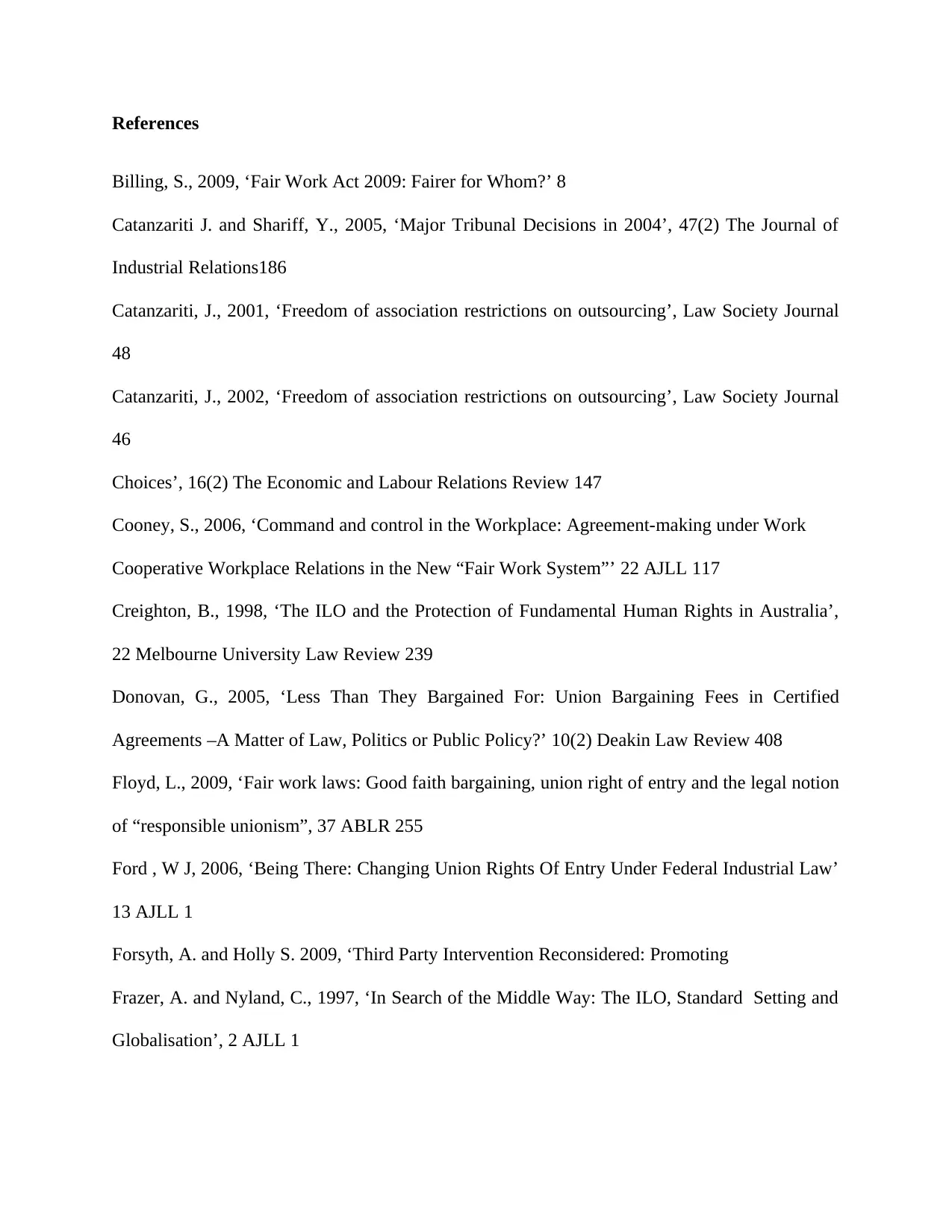
References
Billing, S., 2009, ‘Fair Work Act 2009: Fairer for Whom?’ 8
Catanzariti J. and Shariff, Y., 2005, ‘Major Tribunal Decisions in 2004’, 47(2) The Journal of
Industrial Relations186
Catanzariti, J., 2001, ‘Freedom of association restrictions on outsourcing’, Law Society Journal
48
Catanzariti, J., 2002, ‘Freedom of association restrictions on outsourcing’, Law Society Journal
46
Choices’, 16(2) The Economic and Labour Relations Review 147
Cooney, S., 2006, ‘Command and control in the Workplace: Agreement-making under Work
Cooperative Workplace Relations in the New “Fair Work System”’ 22 AJLL 117
Creighton, B., 1998, ‘The ILO and the Protection of Fundamental Human Rights in Australia’,
22 Melbourne University Law Review 239
Donovan, G., 2005, ‘Less Than They Bargained For: Union Bargaining Fees in Certified
Agreements –A Matter of Law, Politics or Public Policy?’ 10(2) Deakin Law Review 408
Floyd, L., 2009, ‘Fair work laws: Good faith bargaining, union right of entry and the legal notion
of “responsible unionism”, 37 ABLR 255
Ford , W J, 2006, ‘Being There: Changing Union Rights Of Entry Under Federal Industrial Law’
13 AJLL 1
Forsyth, A. and Holly S. 2009, ‘Third Party Intervention Reconsidered: Promoting
Frazer, A. and Nyland, C., 1997, ‘In Search of the Middle Way: The ILO, Standard Setting and
Globalisation’, 2 AJLL 1
Billing, S., 2009, ‘Fair Work Act 2009: Fairer for Whom?’ 8
Catanzariti J. and Shariff, Y., 2005, ‘Major Tribunal Decisions in 2004’, 47(2) The Journal of
Industrial Relations186
Catanzariti, J., 2001, ‘Freedom of association restrictions on outsourcing’, Law Society Journal
48
Catanzariti, J., 2002, ‘Freedom of association restrictions on outsourcing’, Law Society Journal
46
Choices’, 16(2) The Economic and Labour Relations Review 147
Cooney, S., 2006, ‘Command and control in the Workplace: Agreement-making under Work
Cooperative Workplace Relations in the New “Fair Work System”’ 22 AJLL 117
Creighton, B., 1998, ‘The ILO and the Protection of Fundamental Human Rights in Australia’,
22 Melbourne University Law Review 239
Donovan, G., 2005, ‘Less Than They Bargained For: Union Bargaining Fees in Certified
Agreements –A Matter of Law, Politics or Public Policy?’ 10(2) Deakin Law Review 408
Floyd, L., 2009, ‘Fair work laws: Good faith bargaining, union right of entry and the legal notion
of “responsible unionism”, 37 ABLR 255
Ford , W J, 2006, ‘Being There: Changing Union Rights Of Entry Under Federal Industrial Law’
13 AJLL 1
Forsyth, A. and Holly S. 2009, ‘Third Party Intervention Reconsidered: Promoting
Frazer, A. and Nyland, C., 1997, ‘In Search of the Middle Way: The ILO, Standard Setting and
Globalisation’, 2 AJLL 1

Hall, R., 2005, ‘Australian Industrial Relations in 2005–The WorkChoices Revolution’ 48(3)
Journal of Industrial Relations 291
Journal of Industrial Relations 291
1 out of 10
Related Documents
Your All-in-One AI-Powered Toolkit for Academic Success.
+13062052269
info@desklib.com
Available 24*7 on WhatsApp / Email
![[object Object]](/_next/static/media/star-bottom.7253800d.svg)
Unlock your academic potential
© 2024 | Zucol Services PVT LTD | All rights reserved.





